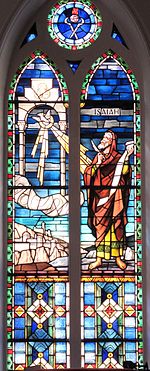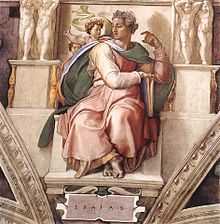Isaiah: Difference between revisions
No edit summary |
rm Mormon section, per talk |
||
| Line 73: | Line 73: | ||
The remaining years of Hezekiah's reign were peaceful ({{bibleverse|2|Chr|32:23–29|HE}}). Isaiah probably lived to its close, and possibly into the reign of Manasseh, but the time and manner of his death are not specified in either the [[Bible]] or recorded history. There is a tradition (reported in both the [[Martyrdom of Isaiah]] and the [[Lives of the Prophets]]) that he suffered martyrdom by [[Manasseh of Judah|Manasseh]] due to pagan reaction. |
The remaining years of Hezekiah's reign were peaceful ({{bibleverse|2|Chr|32:23–29|HE}}). Isaiah probably lived to its close, and possibly into the reign of Manasseh, but the time and manner of his death are not specified in either the [[Bible]] or recorded history. There is a tradition (reported in both the [[Martyrdom of Isaiah]] and the [[Lives of the Prophets]]) that he suffered martyrdom by [[Manasseh of Judah|Manasseh]] due to pagan reaction. |
||
===Isaiah in the Book of Mormon=== |
|||
The [[Book of Mormon]] contains 19 chapters of Isaiah in their entirety, along with parts of a few other chapters. Specifically, chapters 2-14, 48-51, 53, and 54 of Isaiah are contained in the Book of Mormon. Most of Isaiah 52 is contained in the Book of Mormon as well. Approximately 30% of Isaiah is found in the Book of Mormon. |
|||
One [[FARMS]] scholar, John A. Tvedtnes, performed comparisons of the Isaiah variants found in the Book of Mormon with the following versions of the Book of Isaiah: the Hebrew Massoretic text, the Dead Sea scrolls found at Qumran, the Aramaic Targumim, the Peshitta, the Septuagint, the Old Latin and Vulgate, and the Isaiah passages which are quoted in the New Testament. He argues that some of these comparisons show support for the Book of Mormon passages as having been derived from an ancient text.<ref>{{Harvnb|Tvedtnes|1985}}</ref> |
|||
A rebuttal to Tvedtnes's conclusions was given by David P. Wright.<ref>Wright, David P. Isaiah in the Book of Mormon ...and Joseph Smith in Isaiah (completed January 1996; initially published August 1998 on the web) This paper, in slightly revised form, has been published in American Apocrypha: Essays on the Book of Mormon (Dan Vogel and Brent Lee Metcalfe, eds., Salt Lake City: Signature Books, 2002), pp. 157-234. Pulled from Internet at: http://www.xmission.com/~research/central/isabm6.html 10/28/07</ref> In an analysis of each of the examples that Tvedtnes presented, Wright argues that the support given by Tvedtnes was “problematic as proof" and that in some cases Tvedtnes's analysis and evidence was “highly ambiguous, substantially incomplete, strained, or simply in error.” |
|||
==Isaiah in Islamic belief== |
==Isaiah in Islamic belief== |
||
Revision as of 23:42, 22 March 2011
This article needs additional citations for verification. (June 2008) |
Saint Isaiah the Prophet | |
|---|---|
 Isaiah's Lips Anointed with Fire by Benjamin West (1782, Bob Jones University Museum and Gallery). | |
| Prophet | |
| Born | 8th Century B.C.E Judah (?) |
| Died | 7th Century B.C.E |
| Venerated in | Judaism Roman Catholic Church Eastern Catholic Churches Eastern Orthodox Church Lutheranism Islam[1] Armenian Apostolic Church |
| Feast | July 19 |
Isaiah (Hebrew: יְשַׁעְיָהוּ, Modern: Yeshayahu, Tiberian: Yəšạʻyā́hû ; Greek: Ἠσαΐας, Ēsaïās ; Aramaic/Syriac/Assyrian: ܐܫܥܝܐ , Isha`ya ; Arabic: أشعیاء, Ašʿiyāʾ; German: Jesaja; "Yahu is salvation";[2] Template:Pron-en (US), /aɪˈzaɪ.ə/ (UK)[3] was a prophet in the 8th-century BC Kingdom of Judah.[4]
Jews and Christians consider the Book of Isaiah a part of their Biblical canon; he is the first listed (although not the earliest) of the neviim akharonim, the later prophets.[5] Christians believe that Isaiah prophesied the virgin birth of Jesus Christ (Isaiah 7:14, King James version):
"Behold, a virgin shall conceive, and bear a son, and shall call his name Immanuel."
Many of the New Testament teachings of Jesus refer to the book of Isaiah.
Gregory of Nyssa (c. 335–395), believes that the Prophet Esaias (Isaiah) "knew more perfectly than all others the mystery of the religion of the Gospel." Jerome (c. 342–420) also lauds the Prophet Esias, saying, "He was more of an Evangelist than a Prophet, because he described all of the Mysteries of the Church of Christ so vividly that you would assume he was not prophesying about the future, but rather was composing a history of past events."[6]
Islam usually regards Isaiah as a Prophet (although he is not mentioned by name in the Qur'an). Muslims believe that he was one of the many prophets to have prophesied to the Jews after the reign of King David. He is said to have prophesied about the coming of prophet Muhammad.
Biography
This section uses texts from within a religion or faith system without referring to secondary sources that critically analyze them. (February 2011) |

Isaiah prophesied during the reigns of Uzziah (or Azariah), Jotham, Ahaz, and Hezekiah (Isaiah 1:1), the kings of Judah. Uzziah reigned fifty-two years in the middle of the 8th century BC, and Isaiah must have begun his career a few years before Uzziah's death, probably in the 740s BC. Isaiah lived till the fourteenth year of Hezekiah (who died 698 BC), and may have been contemporary for some years with Manasseh. Thus Isaiah may have prophesied for the long period of at least sixty-four years.
Isaiah's wife was called "the prophetess" (Isaiah 8:3), either because she was endowed with the prophetic gift, like Deborah (Judges 4:4) and Huldah (2 Kings 22:14–20), or simply because she was the wife of "the prophet" (Isaiah 38:1). The second interpretation, that it was simply an honorary title, "Mrs. Prophet" as it were, is likely.[7] They had two sons, naming one Jasub, meaning "A remnant shall return"Isaiah 7:3 and the younger, Maher-Shalal-Hash-Baz, meaning, "Spoil quickly, plunder speedily."Isaiah 8:3
In early youth, Isaiah may have been moved by the invasion of Israel by the Assyrian monarch Tiglath-Pileser III (2 Kings 15:19); and again, twenty years later, when he had already entered on his office, by the invasion of Tiglath-Pileser and his career of conquest. Ahaz, king of Judah, at this crisis refused to co-operate with the kings of Israel and Syria in opposition to the Assyrians, and was on that account attacked and defeated by Rezin of Damascus and Pekah of Israel (2 Kings 16:5; 2 Chronicles 28:5–6). Ahaz, thus humbled, sided with Assyria, and sought the aid of Tiglath-Pileser against Israel and Syria. The consequence was that Rezin and Pekah were conquered and many of the people carried captive to Assyria (2 Kings 15:29, 16:9; 1 Chronicles 5:26).



Soon after this Shalmaneser V determined wholly to subdue the kingdom of Israel, Samaria was taken and destroyed (722 BC). So long as Ahaz reigned, the kingdom of Judah was unmolested by the Assyrian power; but on his accession to the throne, Hezekiah, who was encouraged to rebel "against the king of Assyria" (2 Kings 18:7), entered into an alliance with the king of Egypt (Isaiah 30:2–4). This led the king of Assyria to threaten the king of Judah, and at length to invade the land. Sennacherib (701 BC) led a powerful army into Judah. Hezekiah was reduced to despair, and submitted to the Assyrians (2 Kings 18:14–16). But after a brief interval war broke out again, and again Sennacherib led an army into Judah, one detachment of which threatened Jerusalem (Isaiah 36:2–22; 37:8). Isaiah on that occasion encouraged Hezekiah to resist the Assyrians (37:1–7), whereupon Sennacherib sent a threatening letter to Hezekiah, which he "spread before the LORD" (37:14).

Then Isaiah the son of Amoz sent to Hezekiah, saying, Thus saith the LORD God of Israel, That which thou hast prayed to me against Sennacherib king of Assyria I have heard.
This is the word that the LORD hath spoken concerning him; The virgin the daughter of Zion hath despised thee, and laughed thee to scorn; the daughter of Jerusalem hath shaken her head at thee.
Whom hast thou reproached and blasphemed? and against whom hast thou exalted thy voice, and lifted up thine eyes on high? even against the Holy One of Israel.
According to the account in Kings (and its derivative account in Chronicles) the judgment of God now fell on the Assyrian army and wiped out 180,000 of its men. "Like Xerxes in Greece, Sennacherib never recovered from the shock of the disaster in Judah. He made no more expeditions against either southern Palestine or Egypt."[8]
The remaining years of Hezekiah's reign were peaceful (2 Chr 32:23–29). Isaiah probably lived to its close, and possibly into the reign of Manasseh, but the time and manner of his death are not specified in either the Bible or recorded history. There is a tradition (reported in both the Martyrdom of Isaiah and the Lives of the Prophets) that he suffered martyrdom by Manasseh due to pagan reaction.
Isaiah in Islamic belief
Most Muslim scholars, both classical (Ibn Ishaq, Ibn Kathir)[9] and modern (Muhammad Asad, Abdullah Yusuf Ali)[10] accept Isaiah as a true Hebrew prophet, who preached to the Israelites following the death of King David. The Qur'an states:
We did aforetime send messengers before thee: of them there are some whose story We have related to thee, and some whose story We have not related to thee. It was not (possible) for any messenger to bring a sign except by the leave of God: but when the Command of God issued, the matter was decided in truth and justice, and there perished, there and then those who stood on Falsehoods.[11]
Thus, in accordance with belief, Muslims generally accept Isaiah as a Hebrew prophet of the 8th Century B.C. The Book of Isaiah is also used in Qur'anic commentary. Some scholars, including Abdullah Yusuf Ali, are of the opinion that chapter 17, verse 4 of the Qur'an refers to the burning words of Hebrew prophets such as Isaiah.[12]
Rabbinic literature
According to the Rabbinic literature, Isaiah was a descendant of the imperial house of Judah and Tamar (Sotah 10b). He was the son of Amoz (not to be confused with Prophet Amos), who was the brother of King Amaziah of Juda. (Talmud tractate Megillah 15a).[13]
References
- ^ Historical Dictionary of Prophets in Islam and Judaism, B. M. Wheeler, Appendix II
- ^ New Bible Dictionary, Second Edition, Tyndale Press, Wheaton, IL, USA 1987.
- ^ Wells, John C. (1990). ""Isaiah"". Longman pronunciation dictionary. Harlow, England: Longman. p. 378. ISBN 0582053838.
- ^ The Scofield Study Bible III, NKJV, Oxford University Press
- ^ JPS Hebrew English Tanakh, Jewish Publication Society, 2000
- ^ The Lives of the Holy Prophets, Holy Apostles Convent, ISBN 0-944359-12-4, page 101.
- ^ A Brief Introduction to the Old Testament, Michael D. Coogan, Oxford University Press, 2009, Page 273.
- ^ Sayce, Archibald Henry. The ancient empires of the East. Macmillan, 1884, p. 134.
- ^ Isaiah appears as a prophet in Ibn Kathir's Stories of The Prophets
- ^ The Holy Qur'an: Text, Translation and Commentary, Note. 2173 to 17:4: "The Book is the revelation given to the Children of Israel. Here it seems to refer to the burning words of Prophets like Isaiah. For example, see Isaiah, chap, 24. or Isaiah 5:20-30, or Isaiah 3:16-26."
- ^ Quran 40:78
- ^ Possible references include Isaiah 24 and Isaiah 26
- ^ Isaiah at Jewish Encyclopedia
External links
- Sermons on Isaiah
- Isaiah (Isaias) at the Catholic Encyclopedia
- [1] Avraham Gileadi's new translation and commentary on Isaiah
- Prophet Isaiah Orthodox icon and synaxarion
![]() This article incorporates text from a publication now in the public domain: Easton, Matthew George (1897). Easton's Bible Dictionary (New and revised ed.). T. Nelson and Sons.
This article incorporates text from a publication now in the public domain: Easton, Matthew George (1897). Easton's Bible Dictionary (New and revised ed.). T. Nelson and Sons. {{cite encyclopedia}}: Missing or empty |title= (help)
